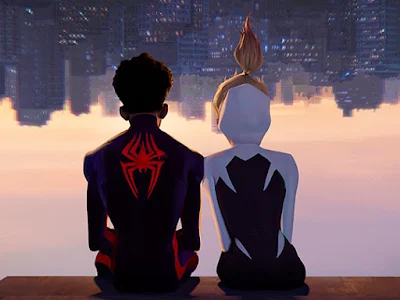Gagamboy
In Philip K. Dick's Flow My Tears, the Policeman Said, celebrity singer and TV host Jason Taverner passes out in a medical facility, having been treated for an attack from a 'Callisto cuddle sponge,' a dangerous parasite (alien, judging from the name) thrown at him by a former lover. He wakes up in a cheap motel, learns he's not only not famous but his friends don't know him, and he has no identification papers-- dangerous situation in Dick's version of 1988 United States, where if you can't prove who you are to one of many police checkpoints in Los Angeles you can be arrested and sent to a forced labor camp.
Slipping past the bonds of reality is a common enough trope in Dick's novels-- in Do Androids Dream of Electric Sheep?, police officer Rick Deckard ends up in a police station he's never heard of, surrounded by androids and accused of being an android himself; in The Man in the High Castle judo instructor Juliana Frink learns from novelist Hawthorne Abendsen that their world is actually a lie, and in the real world the Japanese and Germans lost World War 2. Much as I love those titles, they don't inspire quite the same level of terror as Flow My Tears does: one moment you're dying from poisoned tendrils digging into your chest, the next you're in a world where you literally do not exist. More disturbing I submit than finding yourself on an alien planet: for one you travel to said planet, and the journey helps you prepare for new sights and sounds (okay there's teleportation, but put that aside a moment); for another you're not in a totally different environment but a slightly different environment-- might take hours even days before you spot the difference.
Helps that Dick takes the time and effort to realize each universe so that there's a wealth of accumulated details; when the details change, however slightly, your carefully heightened senses are immediately, unaccountably jarred. In Dr. Strange and the Multiverse of Madness, Everything Everywhere All at Once, and the Spider-verse movies, moving across realities is more like channel surfing; you spin your trackball and the screen goes cray-cray. Your reaction to said worlds, the alienation and fear they may possibly provoke don't matter; anyway, you're a spider-bitten superhero not a fleshed-out but vulnerable human figure, you can probably handle anything those pesky multiverses can throw at you.
Which is my roundabout way of summing up my feelings about this whole trending thing. O I like Raimi's loose-limbed funny way with cartoon narratives, and I like Everything Everywhere's low-budget aesthetics (though if you want something even lower budget but just as fun I recommend Martika Ramirez Escobar's Leonor Will Never Die), but my limited reserves of goodwill seem to have run out with these Spider-Verse pics. Not sure why; maybe it's because unlike in the Spider-Verse movies, I can sense a sensibility shimmering through their shiny surfaces (Raimi's, the Daniels', Escobar's); maybe it's because the low-budget productions are so wonderfully low-tech (in the Daniels', weird light effects are achieved through a wheel of spinning light bulbs; in Escobar, a man joins his mother in the next universe by ramming his head into a TV screen).
Maybe it's because of something Michael Chabon once said in The Amazing Adventures of Kavalier and Klay: doesn't matter what the superhero can do, what matters is why he does it. Bruce Wayne's fascinating because his parents were killed when he was a child, and he's been fighting that trauma ever since; Bruce Banner is fascinating because he was irradiated by gamma rays, and when he gets angry he loses his sense of self. Peter Parker-- at least as Steve Ditko and Stan Lee conceived him-- was bitten by a radioactive spider, but that wasn't what made the character interesting; instead he thought he was on top of the world, a punk with super powers, whereupon his Uncle Ben taught him a different lesson, dying from a gunshot wound Peter failed to prevent.
Morales at least in the movies feels uninteresting, tho not without some charm; yes his uncle dies-- but he's a criminal uncle, and his handsomely chiseled police officer dad and lovely housewife mother are available to provide him unconditional love and support. The family's dialogue mostly revolves around Mile's seeming irresponsibility, and Miles' continued frustration that his parents 'don't understand me'-- they've got the skim-milk wholesomeness of a Disney movie.
Peering at Miles' wikipedia entry (have not read the comics), I notice that Miles' dad was actually a reformed criminal; now that sounds like something the writers can build a more interesting relationship on-- but of course these movies are multimilliondollar efforts, hence aimed at the general public including the kids; you can't afford to present a less-than-perfect role model to kids.
That's basically it, my gripe against the movie. Would like to note that Daniel Kaluuya's Spider-Punk and the '90s Sex Pistol poster visual style surrounding him is a lot of fun, and the watercolor style of Hailee Steinfeld's Spider-Gwen is appropriately moody-- tho with artificial intelligences all the rage today, one wonders if maybe the animators didn't just mumble into a microphone ("give me watercolors in the style of Bill Sienkiewicz") and 3D printers did the rest. Unfair, I know, but still.

.jpg)
.jpg)
No comments:
Post a Comment